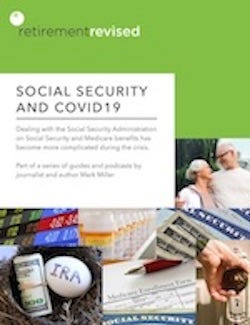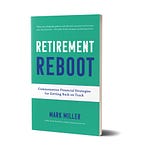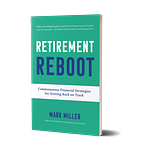
The recession is likely to prompt more people to claim Social Security early if they are forced to retire sooner than expected. But what else influences claiming decisions?
My guest on the podcast this week is Shai Akabas, director of economic policy at the the Bipartisan Policy Center (BPC). He is the co-author of a new study that examines the broader environment in which claiming decisions are made - and it finds that better information, descriptive language and policy incentives could all nudge people toward making more optimal Social Security strategies.
One thing I appreciate about this study is the way it defines “optimal.” It moves beyond the question of the total lifetime benefit a claimant will receive from Social Security, or “break-even” point analysis. That approach tends to push people toward earlier claiming, research has found, because it frames later claiming as a gamble on living longer than average - in other words, beating the longevity odds. Most people have trouble imagining themselves living longer than average lives, especially at younger ages. But the mortality data tells us that many will, and that for married couples chances are good that one spouse will survive to very old age.
Rather, BPC considered a range of holistic questions claimants should consider:
Does your decision provide enough longevity insurance in case you outlive the rest of your savings?
What is the need for money right now, instead of later?
Will my decision impact my surviving spouse?
Click on the player icon at the top of the newsletter to listen to my conversation with Shai. The podcast also can be found on Apple Podcasts, Spotify and Stitcher.
Not a subscriber yet? Take advantage of a special offer

Sign up now for the free or subscriber edition of the newsletter, and I’ll email a copy of my latest retirement guide to you. This one looks at dealing with the Social Security Administration during the COVID19 crisis.
Customer service at the Social Security Administration has changed during the coronavirus crisis - the agency closed its network of more than 1,200 field offices to the public in March.
Just a reminder- subscribers, have access to the entire series of guides at any time. Click on the little green button to subscribe, or go here to learn more.
Disclose wrongdoing? Not all financial planners are complying with the new SEC rules
Millions of investors are now receiving a new government-mandated disclosure form from their financial planners that requires them to list any past misdeeds that have led to regulatory fines or worse. But a terrific Wall Street Journal investigation finds that a sizeable number are not complying.
The Securities and Exchange Commission’s new “Regulation Best Interest” relies heavily on a disclosure form that aims to give investors an easy way to evaluate financial advisers. The form provides information on fees, misconduct and conflicts of interest. It’s called a “customer or client relationship summary” or Form CRS. The disclosures are important, since there is a long and ugly history of abuse of investors by brokers with unethical track records.
The WSJ examined disclosures from thousands of firms, comparing them with the disclosure information on the SEC website:
At least 1,300 brokerage and financial-advisory firms incorrectly stated on the new document that neither they nor their financial professionals had legal or disciplinary histories, the Journal’s analysis showed. That is about 20% of the roughly 6,200 firms in the analysis that reported they had no past blemishes.
Reg BI is a weak rule, plain and simple. We are living in a buyer-beware environment where it is absolutely critical to do your homework before hiring an advisor (or perhaps, firing one). Don’t work with anyone who is not a fiduciary. And, you can look up any adviser’s record on the SEC website.
Recommended reading this week
Bill Bengen revisits the famous 4% drawdown rule . . . How to factor in climate change into a retirement relocation decision . . . Time to get comfortable with the idea of professional decline . . . AARP thinks the 2021 Social Security COLA will be somewhere between 0.5 percent and 1% for 2021 . . . How Social Security could come to a screeching halt . . . Why postal service disruptions can be life-threatening . . . Why dizziness can be a big problem as we age.












